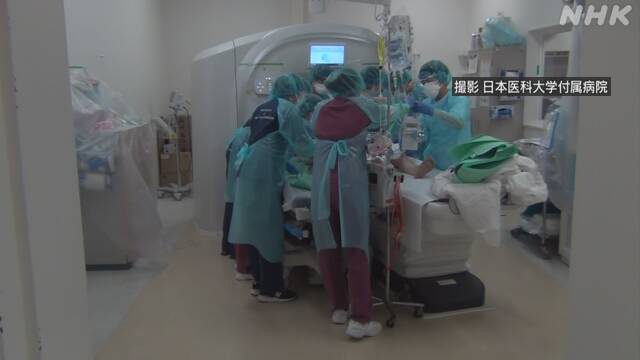As the infection of the new coronavirus spreads, the number of “difficult-to-transport cases” in which the recipients of emergency patients cannot be decided immediately reached a record high of more than 5,400 cases for four consecutive weeks.
Medical care is becoming tight due to the spread of infection, and some university hospitals, which are said to be the "last fortress" in emergency medical care, are in a state where only about 60% of patients with urgent injuries and illnesses can be accepted. There is also.
Accepting emergency patients “about 60%”
At Nippon Medical School Hospital in Bunkyo-ku, Tokyo, there are nearly 300 requests for acceptance of urgent emergency patients a month in winter, when there are many transports due to heart disease and stroke, and the new corona infection is transmitted. In January, just before the expansion, more than 90% of the respondents responded.
However, since the rapid expansion of Omicron strains since last month, many medical institutions have narrowed down the acceptance of general emergency patients, so the number of requests for patients to be accepted into this hospital is increasing more than usual, and the treatment makes patients urgent. There is no hospital that accepts patients even if they get out of the state of illness, and it is difficult to vacate emergency beds, so only about 60% of them are accepted.
At hospitals, there are a number of cases where staff cannot go to work due to close contact, and it is becoming difficult to secure medical staff and beds.
"The acceptance of emergency patients other than Corona is tougher than it was during the fifth wave of last summer, and the number of seriously ill Corona is increasing this week, making it even more difficult," said Masaji Yokobori, director of the Advanced Critical Care Center. I'm trying to get rid of the emergency bed, but it's difficult. I want you to be careful not to get sick or inadvertently injured. "
"Cases of difficult transportation" over 5400 cases
The Fire and Disaster Management Agency of the Ministry of Internal Affairs and Communications reports on 52 fire departments nationwide, including the fire department where the prefectural office is located, as "cases where transportation is difficult", such as cases where there were four or more inquiries to the hospital before the destination of the patient was decided. It is summarized every week based on it.
In the week leading up to the 6th of this month, there were 5469 cases, a further increase from 5303 cases in the previous week, which was a record high.
Of these, 1983 cases were suspected of being infected with the new coronavirus, accounting for 36% of the total, and 3486 cases were not suspected of being infected, accounting for 64% of the total.
The Fire and Disaster Management Agency of the Ministry of Internal Affairs and Communications said, "It is a difficult situation with the highest number ever. We will continue to work with the Ministry of Health, Labor and Welfare to reduce cases of difficult transportation."
In Tokyo, "more than 5 hours before transportation"
In Tokyo, the number of emergency transports of patients infected with the new coronavirus has increased rapidly since entering this year.
According to the Tokyo Fire Department, the number of emergency transports for patients who have been confirmed to be infected and are being treated at home was 685 in the week up to the 6th, an increase of 19% from the previous week.
Increasingly, there are increasing cases where no vacant beds can be found and it takes time to transport, and there are 162 cases in total for 3 hours or more.
Of these, 56 took more than 5 hours.
The number of emergency transports is currently increasing to about 80% of the peak of the 5th wave.
Death at home without deciding where to transport
Under these circumstances, there are cases where even patients with myocardial infarction who need treatment as soon as possible die at home without deciding the hospital to which they will be transported.
A 76-year-old man living in Tokyo had a low blood pressure at his home on the 2nd of this month and was about to become conscious, and a visiting nurse called an ambulance.
The ambulance crew searched for a host, including hospitals outside of Tokyo, because they may have had a myocardial infarction, but they could not find it even after about three hours.
The ambulance crew contacted their home doctor and took them home, and the rushed doctor gave them oxygen, but the next morning the man died.
He said the cause of death was diagnosed as acute myocardial infarction.
Myocardial infarction is more likely to occur in winter, and in acute myocardial infarction, it is said that the survival rate will increase if catheter treatment is performed within 2 hours after the onset.
The man's wife said, "I thought that I would be able to help as long as I got in the ambulance, so I was surprised at the dream that this would happen. I think I was in a situation where I couldn't help looking for a hospital, but I hate Corona when I think that I could have lived a little longer and watched the growth of my grandchildren together if I was treated at the hospital. I was talking.
"Other cases that cannot be transported ..."
Kazuma Tashiro, director of "Hinata Zaitaku Clinic Sanno," where the doctor who was contacted by the ambulance crew worked, said, "The man may have recovered if he was transported promptly. I heard that a patient with intestinal obstruction who could not find a destination died, and that there was a case where another medical institution could not transport a patient with submucosal bleeding. Is a critical situation. "

